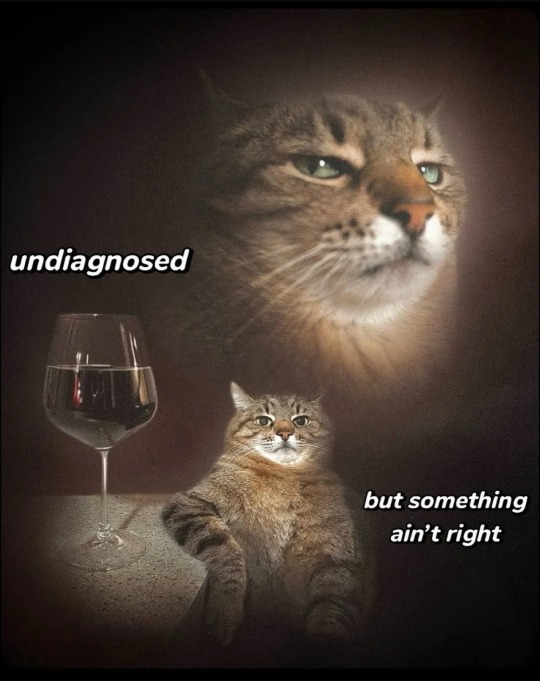Text
Google search how to reset the body's score counter. Google average score kept by body. Body score counting rigged site:reddit.com
5K notes
·
View notes
Text
sorry for being weird and evasive. i was raised to believe that having wants and needs was a moral failing
36K notes
·
View notes
Text
does anyone know if you can get in trouble for feeling weird
65K notes
·
View notes
Text
669 notes
·
View notes
Text
me having a weird time: man this weird time sucks! i don't feel like myself! i wish i was having a normal time!
me having a normal time: well the weird time did have a certain je ne sais quoi...
65K notes
·
View notes
Text
Thanks, Anon!
-submit your poll!-
5K notes
·
View notes
Text
you contradict yourself because you contain multitudes. i contradict myself because i am wrong.
75K notes
·
View notes
Text
Anyone else feel like their mutuals are way out of their league? Like they follow you back and you’re just like

20K notes
·
View notes
Text
I know we've discussed before that the reason we seem to be "introject heavy" is because we tend to rely on outside sources and ideas of how to be a person, but I am feeling that very strongly today. I feel incorrect in every way possible and everything feels very much "not me", so it's just been decided to try to embody a fictional character to give some sense of direction and hope that no one notices the fear eating me from the inside out and that they don't notice how unlike myself I feel.
0 notes
Text
━━╋━ hater.



♱⃝⠀ a flag for alters who are haters.
#oh look its me#im so mad rn#i like ember as a name but im tempted to go by amber just because i know itll piss some folks in the system off
260 notes
·
View notes
Text
I am currently stuck feeling 28 years old which is equally terrifying and interesting because the January before I turned 28 is when I had COVID and I just got over the flu and a sinus infection and I'm experiencing a lot of similar fatigue issues, so like maybe I split around that time and my brain just pulled me up again because "hey, we need a guy who can be sick", but it's also fucking terrifying because I don't feel like I know where I am.
The fuck you mean we live in another state across the country now? The fuck you mean this is my room and I have little altars to pagan deities now? Where did these plushies come from? Whose candles and decorations are these? Where's my desk and dresser?
I know what happened, I know we moved, but also what the fuck is happening???
#screaming to the void#this is especially frustrating because as viscerally afraid as i feel right now as much as i am legit shaking right now#'im' gonna come back to this post later and be like 'wow that was dramatic of me there's no way i actually felt like that.'#'i was just being dramatic' i know its going to happen#its going to happen because i already feel like im sitting next to someone else inside my own goddamn body#i can tell that whoever is around is just experiencing this as bleed through and im just managing to grt enough control to get this written#out and documented for my own sanity#yes sometimes we do genuinely feel like different people or like were out of our correct time places you dumb bitch#(im sorry that was mean but oh my god quit it with just saying youre being dramatic as stop it i dont know where the fuck i am right now#because you shitheads moved us across the country on an impulse)#this is real this is a real feeling i am having in my chest its like a pressure around the sternum for your somatic therapeutic shit okay?#i physically feel upset right now and i don't feel fully in control of my body. i feel like im having to possess it and control it#like a goddamn puppet so i can get my point across and get all these words out#youre gonna look back on this and be like 'wow that was wild i cant believe i did all that for attention and or to be dramatic because i#felt bad and didnt understand my feelings' and im going to come back and kick you in the head#bitch attention from who? youve already been pegged as a system before people have noticed the switches and dont come at me with#the accidental faking or whatever i swear i throttle you#just let things be okay? just let them happen. let me be angry and upset and get it all out on paper and out of my system then you can go#back to being ignorant okay?#stop being afraid of whether or not people believe you or whether or not what your experiencing is real because my anger is very real and#im tired of it being ignored.#my name is probably amber by the way i like the way it sounds even if you dumb fucks dont bite me
1 note
·
View note
Text
Hey everyone check THIS out *floats lifelessly down a river*
167K notes
·
View notes
Text
having a freeze response to stress is so funny in the context of normal adult stressors. millions of years of evolution are trying to tell me that the email will not find me if i stay very still and do nothing
129K notes
·
View notes



